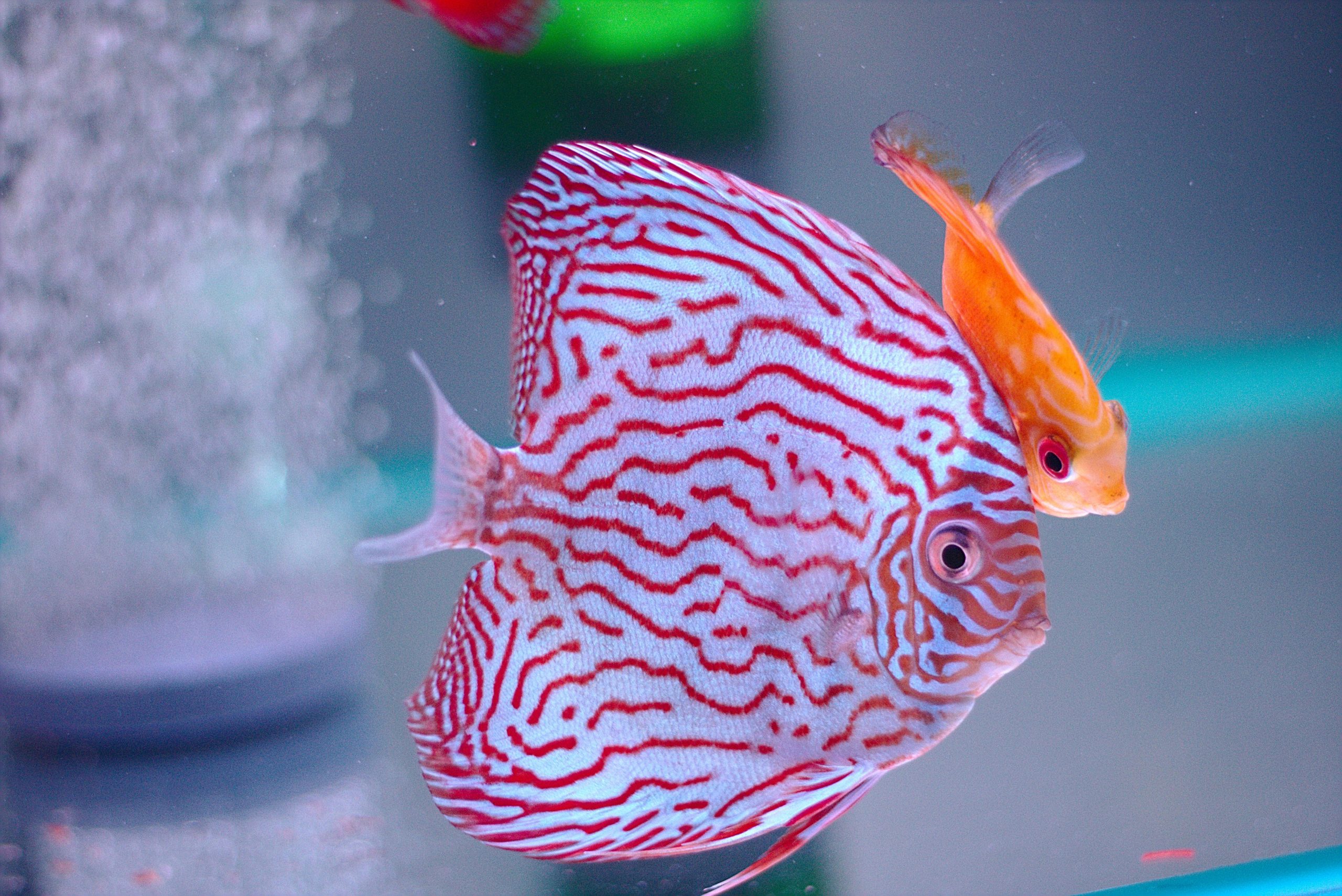Table of Contents
![]()
Discus fish, renowned for their vibrant colors and graceful movements, are often considered the jewel of the freshwater aquarium world. However, maintaining a discus aquarium involves a unique set of challenges that require careful attention and dedication. This article delves into the various aspects of keeping a discus aquarium, highlighting the challenges and providing guidance for overcoming them.
Introduction
Discus fish (Symphysodon spp.) are native to the Amazon Basin in South America and are admired for their striking appearance and gentle nature. Their vibrant colors and intricate patterns make them a popular choice among aquarium enthusiasts. However, their beauty comes with specific care requirements that can present challenges to both novice and experienced aquarists. Understanding these challenges is crucial for creating a thriving environment for discus fish.
Tank Setup
Tank Size and Space
Discus fish require a spacious environment to thrive. A minimum tank size of 75 gallons is recommended for a small group of discus. Larger tanks are preferable as they provide more room for swimming and help maintain stable water conditions. A well-sized tank also reduces stress and aggression among discus, which are social fish that prefer to be in groups.
Tank Equipment
- Filtration Systems: Discus fish are sensitive to water quality, making a high-quality filtration system essential. Canister filters or sump systems are preferred as they provide efficient mechanical, biological, and chemical filtration, helping to keep the water clean and stable.
- Heaters: Discus fish thrive in a temperature range of 82-86°F (28-30°C). A reliable heater is crucial to maintain a consistent temperature, as fluctuations can stress the fish and lead to health issues.
- Lighting: Proper lighting not only enhances the colors of the discus but also supports the growth of beneficial microorganisms in the tank. A moderate lighting setup with a light cycle of 10-12 hours a day is typically recommended.
Substrate and Décor
- Substrate: Discus fish prefer a soft substrate, such as sand or fine gravel, which is gentle on their delicate fins. A soft substrate also makes it easier to clean the tank and reduces the risk of injury.
- Décor: While discus appreciate hiding spots, the tank should also have open swimming spaces. Driftwood, rocks, and plants can provide hiding spots without overcrowding the tank.
Water Quality
Water Parameters
- Temperature: Maintaining a stable temperature within the ideal range is crucial for the health of discus fish. Fluctuations can lead to stress and increase susceptibility to diseases.
- pH Levels: Discus fish prefer slightly acidic to neutral water, with a pH range of 6.0-7.5. Regular monitoring and adjustments are necessary to keep the pH stable.
- Hardness: Soft water is ideal for discus. Water hardness should be kept low to mimic their natural habitat and support their overall well-being.
Filtration and Maintenance
A high-quality filtration system is vital for maintaining optimal water conditions. Regular water changes, typically 20-30% weekly, help to remove waste and replenish essential minerals. Cleaning the tank and equipment on a regular basis prevents the buildup of harmful substances and ensures a healthy environment.
Testing and Monitoring
Regular testing of water parameters is essential for preventing and addressing issues before they become serious. Essential tests include ammonia, nitrite, nitrate, and pH levels. Using reliable testing kits and keeping a log of results can help track changes and identify problems early.
Diet and Nutrition
Diet Requirements
Discus fish require a varied diet to meet their nutritional needs. High-quality pellets or flakes designed for discus can form the basis of their diet. Supplementing with live or frozen foods, such as bloodworms, brine shrimp, and daphnia, provides additional nutrients and stimulates natural feeding behaviors.
Feeding Frequency and Quantity
Discus fish should be fed small amounts 2-3 times a day. Overfeeding can lead to water quality issues and health problems, so it is important to provide only what the fish can consume in a few minutes.
Special Considerations
Adding dietary supplements, such as vitamin C or spirulina, can enhance the health and color of discus fish. However, it is essential to use these supplements according to the manufacturer’s instructions to avoid over-supplementation.
Health and Disease Management
Common Diseases and Disorders
Discus fish are susceptible to several diseases, including white spot (Ich), gill flukes, and internal parasites. Symptoms of disease may include changes in behavior, discoloration, or physical abnormalities. Early detection and treatment are crucial for successful recovery.
Treatment and Medication
When treating diseases, it is important to follow the instructions for medications carefully. Quarantining sick fish in a separate tank can help prevent the spread of diseases to healthy individuals. Always ensure that any medications used are suitable for discus fish.
Preventing Health Issues
Maintaining a stress-free environment is key to preventing health issues. Avoid sudden changes in water conditions, ensure proper tank mates, and provide a well-balanced diet to support the overall health of discus fish.
Social Behavior and Tank Mates
Discus Social Structure
Discus fish are social animals that thrive in groups. Keeping them in pairs or small groups helps establish a natural hierarchy and reduces stress. A well-balanced social structure minimizes aggression and promotes healthy behavior.
Choosing Compatible Tank Mates
Selecting suitable tank mates is crucial for a harmonious aquarium. Discus fish generally do well with other peaceful species that share similar water conditions. Avoid aggressive or fin-nipping fish that could stress or harm the discus.
Observing Behavior
Regular observation of discus behavior helps identify signs of stress or aggression. Interventions, such as adjusting tank mates or altering tank setup, may be necessary to resolve issues and maintain a peaceful environment.
Breeding and Reproduction
Breeding Conditions
Breeding discus fish requires specific conditions, including stable water quality and a suitable breeding environment. A separate breeding tank with appropriate décor and water parameters can facilitate successful reproduction.
Raising Fry
Caring for discus fry involves providing a specialized diet and ensuring optimal water conditions. Fry grow rapidly and require frequent feeding and careful monitoring to support their development.
Challenges in Breeding
Breeding discus can be challenging due to their specific requirements and potential health issues. Providing adequate space and resources, as well as managing additional tank setups, can be demanding but rewarding for dedicated hobbyists.
Cost and Time Commitment
Initial Setup Costs
Setting up a discus aquarium involves significant initial costs, including the tank, equipment, and purchase of discus fish. Ongoing expenses for maintenance, food, and equipment replacement should also be considered.
Time Investment
Maintaining a discus aquarium requires a considerable time investment. Daily feeding, regular water testing, and weekly water changes are essential for keeping the tank in optimal condition. Additionally, troubleshooting and problem-solving may require additional time and effort.
Environmental and Ethical Considerations
Sourcing Discus
Ethical sourcing of discus fish is important for supporting sustainable practices. Opting for captive-bred fish rather than wild-caught specimens helps reduce the impact on natural populations and ensures better health for the fish.
Sustainable Practices
Implementing sustainable practices, such as reducing waste and supporting ethical breeders, contributes to a more environmentally responsible aquarium hobby. Awareness and careful choices can help promote the well-being of both discus fish and their natural habitats.
Conclusion
Keeping a discus aquarium presents a range of challenges, from tank setup and water quality to health management and breeding. Understanding these challenges and preparing for them can lead to a successful and rewarding aquarium experience. By providing proper care, maintaining a stable environment, and addressing issues promptly, hobbyists can enjoy the beauty and grace of discus fish while ensuring their health and well-being.
Share This





Be the first to comment